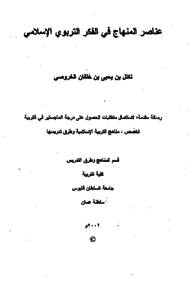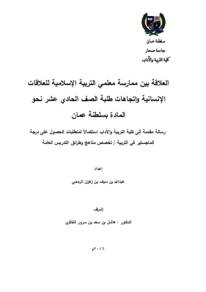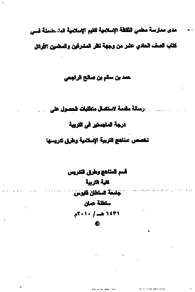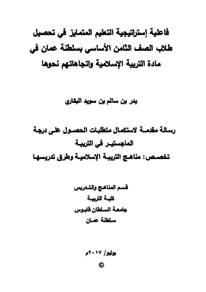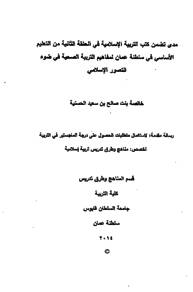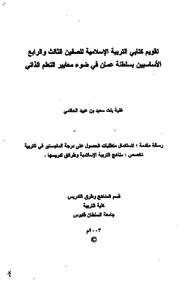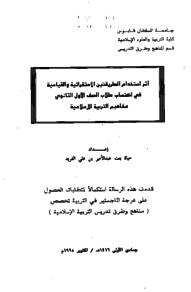Document
عناصر المنهاج في الفكر التربوي الإسلامي.
Publisher
جامعة السلطان قابوس
Gregorian
2002
Language
Arabic
Subject
English abstract
This study aims at identifying the elements of curriculum in the Islamic education thought. The main questions of this study are: 1- What are the implication of the characteristics of the Islamic education on the elements of curriculum? 2- What are the contributions of Moslem educators in curriculum? 3- What are the curriculum elements as seen by Moslem educators? To answer these questions the researcher used the descriptive approach in order to direct the relevant literature to the elements of curriculum. Some of the prominent results of the study can be summed as follows: 1 - There is a clear implication of characteristics of Islamic education in the curriculum and its elements. By these elements which in turn has contributed in establishing the ground of the Islamic curriculum. 2- The instructional objectives were seen by Muslim educators to be comprehensive. They do not exclusively develop a certain aspect of human personality rather they call for the integration and balance in all its aspects. 3- The content is characterized as comprehensive and integral. It includes the different sciences whit an emphasis on the religious science and their related disciplines. 4- The teaching methods used by Muslim educators were various and included lecturing, dialogue, discussion, debate, rote learning, dictating, giving illustrative examples and self-learning. 5- The evaluation teaching such as observation, recitation and verbal questions were simple inform and confined to individual evaluation. According to the results, the study recommends developing the curriculum of Islamic education through making use of the viewpoints and experiences of Muslim educators. It also recommends to work out a common format of the instructional objectives in the Islamic countries which takes into consideration the current characteristics and requirements. More over, it necessary to include various viewpoints and thought of Muslim educators in the courses of curriculum and methodology in Teacher Education Colleges.
Member of
Resource URL
Arabic abstract
هدفت الدراسة التعرف على عناصر المنهاج في الفكر التربوي الإسلامي، وذلك من خلال الإجابة عن الأسئلة الآتية:
ا- ما أنعكاس خصائص التربية الإسلامية على عناصر المنهاج المختلفة؟ ۲- ما عناصر المنهاج كما تبدو لدى بعض المربين المسلمين؟ ٣- ما إسهامات المربين المسلمين في نشأة علم المنهاج؟ وللإجابة عن أسئلة الدراسة استخدم الباحث المنهج الوصفي؛ من أجل دراسة وتوجيه النصوص ذات العلاقة بعناصر المنهاج المختلفة، وذلك من خلال الرجوع إلى المصادر الأصلية لبعض المربين المسلمين. ومن أبرز النتائج التي توصلت إليها الدراسة ما يأتي: ا- انعكاس خصائص التربية الإسلامية بشكل واضح على المنهاج وعناصره، مما أسهم في
وضع القواعد الأولى لمنهاج إسلامي. ۲- جاءت أهداف التعليم عند التزيين المسلمين شاملة، لا تقتصر على تنمية جانب من جوانب الشخصية الإنسانية، وإنما تدعو للتكامل والتوازن في كافة المجالات. ۳- تميز المحتوى بالشمول والتكامل، فتضمن مختلف العلوم، مع التركيز على العلوم الشرعية وما يساندها. 4- تنوعت طرق التدريس وأساليبها عند المربين المسلمين، فكان منها الإلقاء، والحوار، والمناقشة، والمناظرة، والتحفيظ، والإملاء، وضرب الأمثال، والتعلم الذاتي م اتسمت أساليب التقويم الملاحظة، والتسميع، والأسئلة الشفوية بالبساطة واقتصارها على التقويم الفردي لكل طالب على حدة، حيث لم يعرف المربون نظام الامتحانات بشكله الحالي.
وقد أوصت الدراسة في ضوء نتائجها بضرورة تطوير مناهج التربية الإسلامية من خلال الاستفادة من آراء وخبرات المربين المسلمين، والعمل على إيجاد صيغ مشتركة الأهداف التعليم في البلاد الإسلامية تراعي ظروف العصر ومتطلباته، وضرورة تضمين مقررات المناهج وطرق التدريس في كليات إعداد المعلمين بالعديد من آراء وأفكار المربين المسلمين.
ا- ما أنعكاس خصائص التربية الإسلامية على عناصر المنهاج المختلفة؟ ۲- ما عناصر المنهاج كما تبدو لدى بعض المربين المسلمين؟ ٣- ما إسهامات المربين المسلمين في نشأة علم المنهاج؟ وللإجابة عن أسئلة الدراسة استخدم الباحث المنهج الوصفي؛ من أجل دراسة وتوجيه النصوص ذات العلاقة بعناصر المنهاج المختلفة، وذلك من خلال الرجوع إلى المصادر الأصلية لبعض المربين المسلمين. ومن أبرز النتائج التي توصلت إليها الدراسة ما يأتي: ا- انعكاس خصائص التربية الإسلامية بشكل واضح على المنهاج وعناصره، مما أسهم في
وضع القواعد الأولى لمنهاج إسلامي. ۲- جاءت أهداف التعليم عند التزيين المسلمين شاملة، لا تقتصر على تنمية جانب من جوانب الشخصية الإنسانية، وإنما تدعو للتكامل والتوازن في كافة المجالات. ۳- تميز المحتوى بالشمول والتكامل، فتضمن مختلف العلوم، مع التركيز على العلوم الشرعية وما يساندها. 4- تنوعت طرق التدريس وأساليبها عند المربين المسلمين، فكان منها الإلقاء، والحوار، والمناقشة، والمناظرة، والتحفيظ، والإملاء، وضرب الأمثال، والتعلم الذاتي م اتسمت أساليب التقويم الملاحظة، والتسميع، والأسئلة الشفوية بالبساطة واقتصارها على التقويم الفردي لكل طالب على حدة، حيث لم يعرف المربون نظام الامتحانات بشكله الحالي.
وقد أوصت الدراسة في ضوء نتائجها بضرورة تطوير مناهج التربية الإسلامية من خلال الاستفادة من آراء وخبرات المربين المسلمين، والعمل على إيجاد صيغ مشتركة الأهداف التعليم في البلاد الإسلامية تراعي ظروف العصر ومتطلباته، وضرورة تضمين مقررات المناهج وطرق التدريس في كليات إعداد المعلمين بالعديد من آراء وأفكار المربين المسلمين.
Category
Theses and Dissertations

